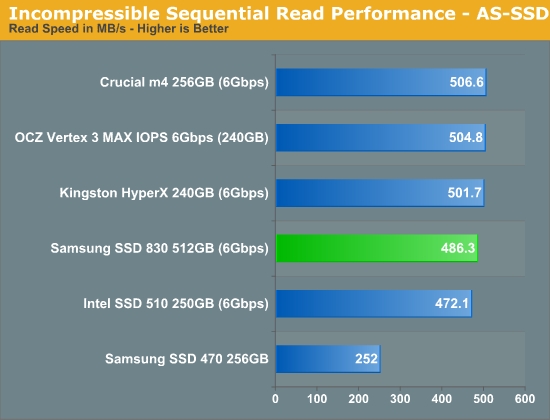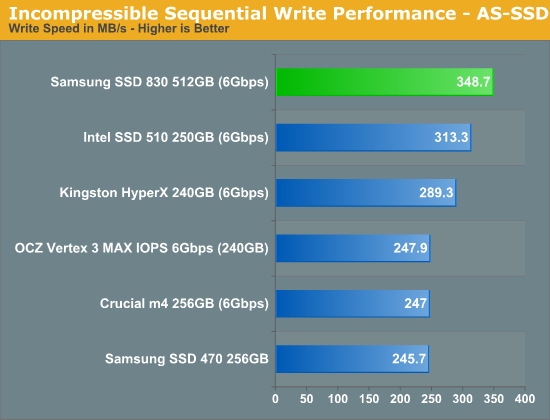The Samsung SSD 830 Review
by Anand Lal Shimpi on September 24, 2011 1:02 AM EST- Posted in
- SSDs
- Storage
- Samsung
- pm830
- Samsung SSD 830
AS-SSD Incompressible Sequential Performance
The AS-SSD sequential benchmark uses incompressible data for all of its transfers. The result is a pretty big reduction in sequential write speed on SandForce based controllers.


Although we saw the 830 take a backseat to the SandForce based offerings in our compressible sequential write test, the roles are reversed in our incompressible write test. Most huge sequential writes are going to be incompressible in nature (e.g. moving a H.264 movie around) so these numbers are quite relevant.










99 Comments
View All Comments
ruzveh - Wednesday, September 28, 2011 - link
hey anand, where are the other tests dude? Where is the boot time test, application open time, app loading time, etc.???abufrejoval - Wednesday, September 28, 2011 - link
This gap between ZEUS and FusionIO, SLC and embedded SAN SSDs on one end and those consumer SSDs on the other end has been narrowing, but it's incredible to see just how much vendors from all over the place fight to keep it from closing.I got enterprise workloads, which aren't all that high, very predictible, with highs and lows in line with typical OLTP front-end shopping patterns as well as some end-of-day processing.
The crux is the need for ultra high availability (or extremely short outages) and KISS answers that better than investing into premium SANs.
I want directly attached SSDs there, preferably in 2.5" form factor and in RAIDs for better capacity management and non-stop replacements.
20,ooo IOPS should do just fine, the real key is reliability and easy non-stop management. Daily overwrite is well below capacity so consumer SSDs should be fine. And I wouldn't mind replacing them after two years, if they'll reliably advise me of their imminent death weeks ahead.
I tried being clever and put Crucial m3 and OCZ Vertex 2 in a mirror set with an SSD aware LSI SAS RAID controller, to offset the risk of immature firmware/controller issues (the original plan was to use a SAN/SSD mirror, but resilvering would be too expensive). That didn't work out too well, because of these garbage collection issues (m3 drives were failed by the RAID controller, just because they took a little longer than their OCZ counterparts).
Of course we used synthetic tests first, "fio" to be exact and that just keeps those drives busy, busy, busy, quite beyond what actual workloads are likely to be. And in those cases the difference in garbage collection strategy caused real clashes, because the Crucial m3 took a finally took a long break when it had exhausted it's free space, while the OCZ stayed ready always, doing garbage collection on each and every write.
In real life, we might never see that problem, because actual IOPS during early mornings (after the day-end processing) might drop below the "magic" threshold" which allows those Crucials to do their garbage collection, but who knows what would happing during Christmas shopping season, when those unknown thresholds might just be exceeded a wee bit...
SSDs are not magnetic hard disks: They contain operating systems that need to be tuned just like your typical Oracle database. What's missing is interfaces which allow to read and set these well defined and published parameters in line with the use case you requrie.
In purely technological terms that should be easy enough. But every vendor, from database, via OS and SSD will want his cut for this reliability and speed, which is why this may not happen for another couple of years.
If only Samsung could make this strategy decision (early or late garbage collection) a user defined setting without price differentiation (enterprise vs. consumer) I'd be so happy!
Why do I think it won't happen?
gixxer - Monday, October 10, 2011 - link
Does anyone have a more concrete release date than "october"? I am starting a new build and if this gets released soo, it will definitly be a contender.DanSmith - Tuesday, December 6, 2011 - link
Hi Anand / All,Wonder if you if could shed any light on this drive supporting AES encryption using the "ATA password" BIOS options. Its been months now and this drive is on the market and there is sooo much conflicting info on the web about this drive supporting AES.
Even samsung themselves can give me a straight answer!!
Anyone who has one of these that can shed any light??
Cheers, Daniel
valhar2000 - Monday, December 26, 2011 - link
What's a TRIM pass? Do you have to run some sort of procedure every now and then to apply TRIM to an SSD? Isn't TRIM supposed to work in real time as files are deleted or moved?kazumoda - Wednesday, February 8, 2012 - link
I've been searching for a place to buy this Samsung PM830 but all I can find is the AM830. Can someone tell me if this is essentially the same thing or is it a vastly different product in terms of performance and reliability? Thanks. Is there any update on the performance of a smaller drive, in particular how does the 256gb version fare in terms of performance to the 512?datalaforge - Monday, February 27, 2012 - link
I recently installed one of these into my 2.26GHZ Unibody MBP. Its great with its 10 second boots and so on. The battery life is not great though. I think that it was better before. Is there anything that can be done?BRKHD1 - Sunday, September 30, 2012 - link
great review I love your site! I recently did a speed test of the samsung 830 on my youtube channel you can check it out here https://www.youtube.com/watch?v=gZJ-pPeE5lA Thanks again!BRKHD1 - Wednesday, November 28, 2012 - link
http://www.youtube.com/watch?v=gZJ-pPeE5lA&fea...